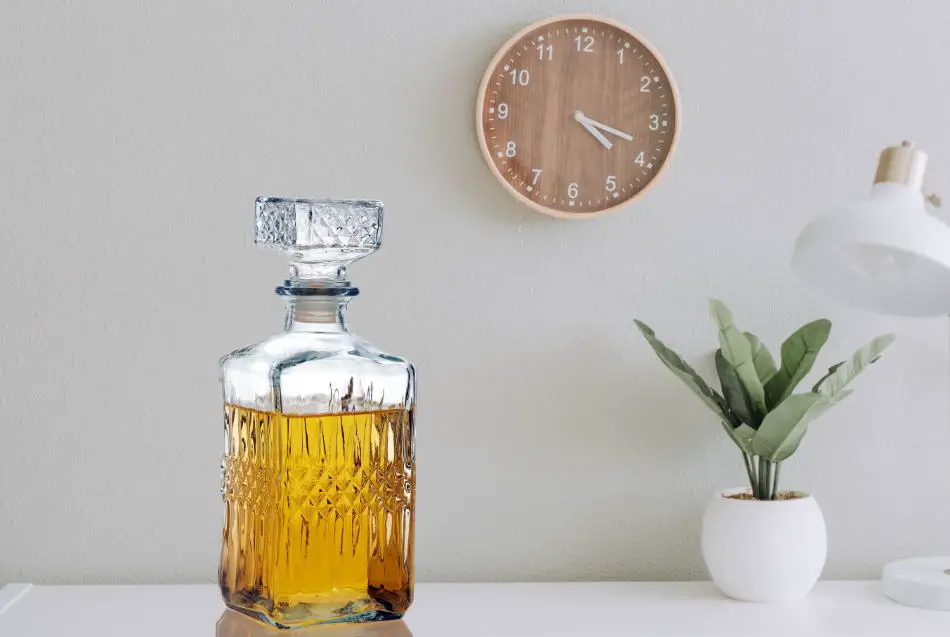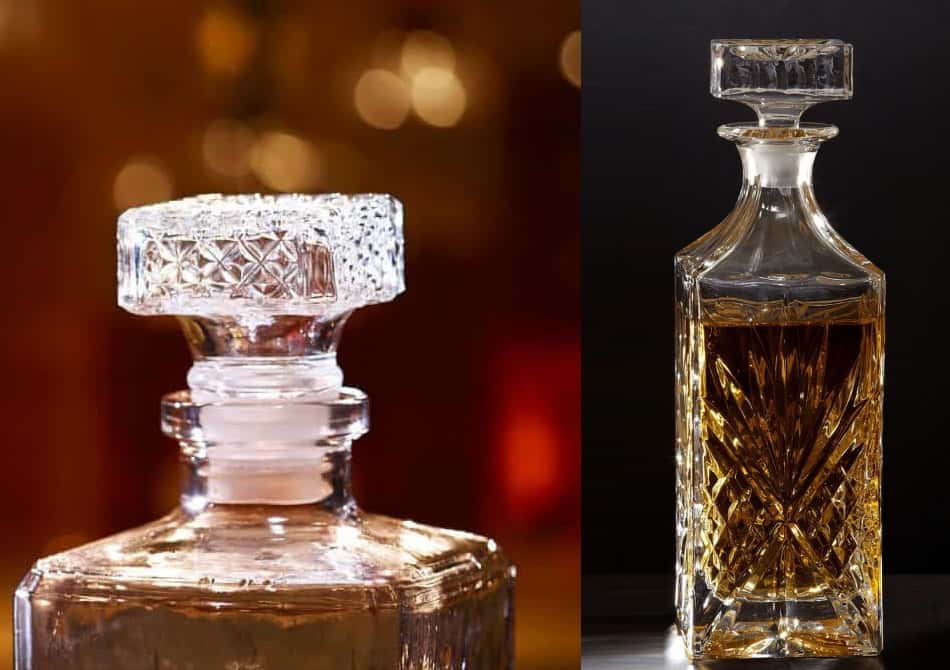I love whiskey decanters as they’re beautiful, stylish, and can have very original designs. They also add an air of class and sophistication to pouring whiskey that makes the whole whiskey drinking process seem much more extravagant and luxurious than it actually is. But I had no idea how long whiskey lasts when stored in a decanter and I want to find out before using one.
Whiskey will last in a decanter between 6 months and 2 years before oxidation causes significant changes to its flavors. If the seal is loose or there’s too much headspace, oxidation will occur much sooner. If you’re only concerned about whiskey going bad, then whiskey will last in a decanter much longer.
In the rest of this article, we’ll look at all this in more detail, and I’ll explain what type of decanter you need to use to ensure whiskey lasts in it for a long time. We’ll also look at when whiskey doesn’t last long in a decanter and at why this is especially true for lead-crystal decanters.
(As a side note, I wrote an article that explains how long whiskey lasts even in the bottle, which you can find here.)

How Long Whiskey Lasts in A Decanter
Whiskey will last a long time in a decanter. That’s because whiskey is a pretty strong drink and under normal circumstances won’t go bad. It only ages in casks so once bottled it won’t deteriorate, and it’s high ABV helps preserve it. So unless you do something to damage your whiskey it won’t spoil, and it should last for a very long time.
However, although whiskey won’t spoil in a decanter it will oxidize. That’s when oxygen binds to one chemical compound and turns it into another, and in whiskey that means one flavor compound changing into another. In other words, oxidation causes the flavors of your whiskey to change.
This change in flavor doesn’t necessarily mean for the worse. It could be for the better, but you won’t know which way your whiskey will change and whether you want to prevent it until after it occurs. That’s why it’s something to avoid especially for more expensive whiskeys.
While oxidation starts as soon as whiskey is poured into a decanter and air can now get to it, it doesn’t change the flavors of your whiskey immediately. That takes time – anywhere from six months to two years depending on the headspace (the empty space in your decanter between the stopper and the whiskey that’s actually air). The more headspace, the more air and the quicker the oxidation process will be. The less headspace, the less air, and the slower the oxidation process will be.
That’s plenty of time to finish your whiskey before it oxidizes and changes flavor, although ironically, the more whiskey you drink, the more headspace there will be in the decanter and the less time you’ll have before the whiskey oxidizes. Once three quarters of the decanter is air, you’ll only have a month before the flavors of your whiskey changes – unless you transfer the remaining whiskey into a smaller decanter.
So when it comes to how long whiskey can be stored in a decanter, you have several months before its flavors start to change. And although change can mean for the worse, that’s just relative to how good it was. Oxidized whiskey can still be good even if it’s worse than it should have been. It takes much longer before whiskey is oxidized to the level that the change in taste is so bad that it becomes unpleasant.
Whiskey Lasts a Long Time in The Right Type of Decanter
Whiskey will only last this long if it’s stored in the right type of decanter. The right type of decanter means:
- It has an airtight seal
- It’s the right size – because it’s full

An Airtight Seal
Some wine decanters don’t have a stopper because you want air to get to the wine, but all whiskey decanters do have a stopper because you don’t want air to get to the whiskey. However, not all stoppers are equal. Some stoppers are just a loose-fitting lid and others are supposedly airtight (at least according to the manufacturer) but are not. Either way you want a seal that’s as airtight as possible.
Also, you want a stopper that’s made from the same material as the rest of the decanter. That’s because most materials expand and contract as the temperature changes, and if the stopper is made from a different material it will expand and contract at a different rate, and air will be able to get into the decanter when the difference leaves tiny gaps between the decanter and the stopper.
The Right Size
Since headspace is an important factor in how much air gets to the whiskey, you can reduce it by using a decanter that’s the right size. The right size means full, so not much bigger than your bottle of whiskey.
You don’t want to use a decanter that’s much bigger than your bottle of whiskey because that will create a lot of headspace in the decanter and your whiskey will oxidize quickly. But you also don’t want to use a decanter that’s smaller than your bottle of whiskey as you’ll leave a lot of headspace in the bottle and the remaining whiskey there will oxidize quickly.
So what size is a bottle of whiskey? Well, whiskey bottles actually come in several sizes as you can see from the table below.
| Bottle Size | Bottle Type |
|---|---|
| 3L | Large size |
| 1.75L | Large size |
| 1L | Large size |
| 750ml | Standard size in the US |
| 700ml | Standard size in the EU |
| 500ml | Miniature size |
| 375ml | Miniature size |
| 350ml | Miniature size |
| 200ml | Miniature size |
| 50ml | Miniature size |
As you can see, there are standard sized bottles of whiskey, so you’ll be able to manage with one decanter that size (actually a little larger).
You could get several different sized decanters to hold whiskey from other sized bottles but if you do, start by getting smaller ones as they can also be used when the amount of whiskey in your standard sized decanter has decreased so much that you want to transfer it to a smaller decanter to reduce the amount of headspace.
When Whiskey Doesn’t Last For a Long Time In a Decanter
There are instances when whiskey doesn’t last for a long time when stored in a decanter and instead oxidizes faster or even goes bad. Whiskey won’t last in a decanter if it’s stored in:
- Direct light or direct sunlight
- Fluctuating temperatures
For more information about how to store whiskey properly in general, see the more detailed article I wrote about it here.
Direct Light or Direct Sunlight
The ultraviolet rays of the sun bleach out the color pigments of the whiskey and direct light and (worse) direct sunlight will change the flavor of whiskey as it breaks down the volatile compounds. The flavor of whiskey stored in direct light or direct sunlight will degrade in one or two months causing it to taste much harsher, possibly even of rubber, paint thinner or rotten fruit.
Fluctuating Temperatures
If a decanter is stored somewhere with a lot of temperature fluctuations then the whiskey will oxidize quicker than usual. That’s because changes in temperature cause air to flow into the decanter, so the more the temperature fluctuates the more air will get into the decanter.
So if you want your whiskey to last in a decanter, make sure to store it away from direct light and direct sunlight and in a cool and stable environment.
How Long Whiskey Lasts in Lead-Crystal Decanters
There’s no doubt that lead-crystal decanters can be some of the most beautiful. Lead-crystal bends light more than glass so they’re usually clearer and brighter and sparkle more extravagantly.
However, the lead can leach into the whiskey and over time it will reach dangerous levels. Whiskey doesn’t last very long in a lead-crystal decanter as it quickly picks up too much lead.
Since lead poisoning is something to be avoided it’s essential to stay away from lead-crystal decanters completely and only use decanters made of glass or lead-free crystal. Lead-free crystal decanters can be just as clear and brilliant as lead-crystal decanters, and as an added bonus lead-free crystal decanters and glass decanters are usually cheaper.

